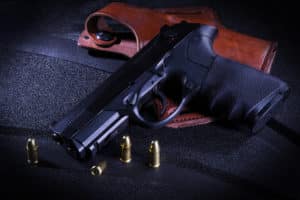Carry Permit Decision from NJ Supreme Court on Hearing Procedures
In re Application for Permit to Carry a Handgun of Calvin Carlstrom (A-63-18) (081981)
Argued October 24, 2019 — Decided January 28, 2020

The application was approved by the Roselle Police Department, however, it was denied by the Union County Superior Court. The Superior Court held that an applicant seeking a carrier’s permit must demonstrate that he or she has “a justifiable need to carry a handgun.” The applicant in this case failed to show any specific threats or previous attacks that would justify a need to carry a firearm. Additionally, the Superior Court made its decision without holding a hearing.
Mr. Carlstrom appealed the decision but the Appellate Division affirmed the Superior Court’s decision. He then filed an appeal with the New Jersey Supreme Court. The High Court declined to decide whether the lower court’s reasoning for denying the application was proper. Rather, it clarified whether the applicant is entitled to hearing and if so, the extent and parameters of the hearing.
Is an applicant for a gun carry permit in New Jersey entitled to a hearing and how should that be conducted?
To start, the Supreme Court outlined the proper procedures when seeking to obtain a permit to carry handgun. The Court indicated it is a two-step process, wherein, the application must first apply to the chief of the police in the municipality where the applicant resides and then, if approved, the application is forwarded to the Superior Court.
The application itself is subject to many requirements. It shall be signed by the applicant under oath and shall be endorsed by three reputable persons who have known the applicant for at least three years preceding the date of application” and who shall also certify thereon that the applicant is a person of good moral character and behavior. The application shall also be accompanied by a written certification of justifiable need to carry a handgun, which shall specify in detail the urgent necessity for self-protection. Additionally, the certification should provide specific threats or previous attacks which demonstrate a special danger to the applicant’s life that cannot be avoided by means other than by issuance of a permit to carry a handgun. Moreover, the certification, when possible, should corroborate the existence of any specific threats or previous attacks.
Further, the applicant must also demonstrate to the police chief that he or she is thoroughly familiar with the safe handling and use of handguns. And lastly, the application cannot be approved unless the applicant shows that he or she is not disqualified from purchasing a firearm. A person is may be disqualified for a number reasons such as, they were convicted of a crime, they are subjected to a restraining, they are suffering from a physical or mental condition which would make it unsafe for them to handle a gun, they have substance abuse problems, or pose a danger the public.
If the application is denied the police, the applicant may request a hearing before the Superior Court in the county where the applicant resides. If the application is approved, it will be presented to the Superior Court and the court shall issue the permit to the applicant if it is satisfied that the applicant has met all the statutory requirements.
The statute expressly provides that if the police deny the application, the applicant may request a hearing. The statute is silent, however, on whether the applicant is entitled to a hearing if the Court denies an application.
To resolve this issue, the Supreme Court received some assistance from the Administrative Office of the Courts (AOC). Shortly after the Court decided to review the matter, the AOC issued a directive instructing the courts that if it had any questions regarding the applicant or his or her permit to carry application, it must hold a hearing to address those questions. Relying on the directive, the Supreme Court ruled that the County Superior Courts should schedule a hearing if it has any questions. The Judge shall issue a notice scheduling the hearing and shall also submit a statement of reasons for its intent to deny the application. The hearing must be held no later than 30-days after receipt of the application and the Judge shall make a determination within 14-days after the hearing.
At the hearing, the applicant should be afforded the opportunity to proffer reasons why he or she satisfied the standard and respond to any questions from the Judge. Amendments to the application as well as other evidence not included in the application may be admitted at the Judge’s discretion. Additionally, If the applicant conducted informal discussions regarding his or her application with the police chief, the content of those discussions may be presented to the Court as may any written conclusions by the reviewing chief or superintendent. The applicant may request to call the chief or superintendent, at the judge’s discretion, if the applicant demonstrates a basis for the testimony. Testimony by individuals such as the applicant and his or her employer may be taken at the hearing at the Judge’s discretion.
